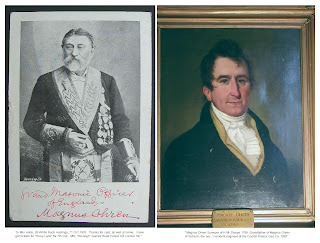How do you fancy looking through my holiday snaps? The phrase fills you with dread, doesn't it? Hours of trawling through pictures of places you've never been to, and may never go to, depicting experiences you've never had and never will have. They're moments after all, and very personal. So why would anyone else be remotely interested in them?
The same could be said of one's family history. It's personal. It's about who I am and where I've come from, genetically and environmentally speaking. It's about, God forgive me for using this phrase, my journey. It's of no relevance to anyone else, nor can I expect anyone else to be interested in it. After all, everyone else has their own families to worry about, their own ancestries to concern themselves with, or not as the case may be. For some it's an area they have no interest in at all. And that's fine. Nobody expects you to care who your 3x great-uncle was or what he did in the Boer War.
 |
| A Tree. Doesn't matter whose it is. |
Two factors can be identified as key in the widespread increase in popularity of family history. They are That Internet and That Telly. Who would imagine that, by 2012, one of the most popular uses of That Internet - besides looking at cats that look like dictators, and naughty stuff - is doing family history research. The amount of historical information now available for a handful of Google searches is mindblowing. So, unfortunately, is the amount of potential for error, misuse and misunderstanding of this information. It's hard enough when you're trying to look for a specific name in a 200 year old, hand written document - harder still when you're being paid peanuts or less to make sense of pages of badly scrawled names for which you have no reference points. So it is no surprise that, even when you pay good money to access websites that offer transcribed records, often what you get is bobbins, requiring often Heculean lateral shifts in thinking to find what you're looking for.
The trouble with That Internet is that people tend to believe what they see on it. I mean there are still people - not to mention journalists - who use Wikipedia as a reliable source. So you type in Smith and instantly you have a family of millions, even though there's no proof that any of them are connected. There's a phenomenon known as Pacman Genealogy, whereby people aim to get a high score of number of people in their tree, without any effort to verify facts, establish relationships etc. These are the people who will find your tree on a website, latch onto a random surname that happens to be in both your tree and theirs, link to your tree and hang on to it for dear life, even though in reality none of your or their ancestors came within 100 miles of each other.
Then there's That Telly. Programmes like Who Do You Think You Are - which has become the average person in the street's buy-in to all things genealogical - perpetuate the myth that doing your family history is a slice of Battenberg. You can turn up at some random library and a member of staff is there, ready with all the records you need. Stuff comes through the post while you're driving to the place where uncle Sid was buried. Genealogy while you wait.
 |
| Two men who died a very very long time ago |
So now family history research is something that we fit in around the other activities we indulge our copious free time in, like football and birdwatching. Because we can do it quickly. No interminable days spent in dusty records offices with scant return, when we can pay a tenner and get what we're looking for in our lunch break. This perception of instantness can tend towards a lackadaisical attitude to verification. It's important to remain cycnical - just about any historical document could include inaccuracies, lies and misinformation. Just because it's official, don't mean it's right.
Maybe in some future blog I'll bore you with details of my own family history. They're a fascinating bunch, but then I would say that. They're my holiday snaps.